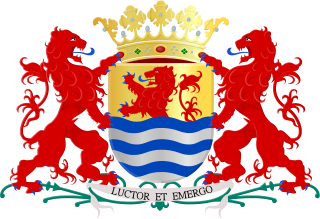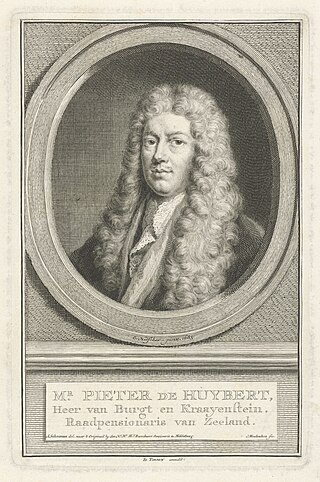
Justus de Huybert (Zierikzee, 1610 - Zierikzee, 4 September 1682) was a Dutch politician and diplomat. He held offices of the States of Zeeland in the middle years of the 17th century.

Justus de Huybert (Zierikzee, 1610 - Zierikzee, 4 September 1682) was a Dutch politician and diplomat. He held offices of the States of Zeeland in the middle years of the 17th century.
Justus (who was actually baptized Joos, after his grandfather [1] ) was the second son of the Zierikzee Regent Adriaan de Huybert, who held many positions in the government of the city of Zierikzee in the Zeeland province of the Dutch Republic, and Anthonetta Teellinck. He studied law at Leiden university. He married three times, with Anna Engelbrecht (1640), Levina Munniks, and Geertruida Vorstius (1676; after twice being widowed), [1] and he had two daughters: Genoveva and Anthonia, and a son: Adriaan, from the first marriage. [1] [2]
Justus was unable to become a member of the Vroedschap of the city of Zierikzee, because his father was already a member, but in 1645 he was appointed Schepen of the city. In 1649 followed an appointment as pensionary and clerk of the city. [1]
In 1652 the States of Zeeland nominated him as an ambassador of the Dutch Republic to Denmark–Norway and Sweden. In 1660 he was sent together with Godard Adriaan van Reede , Coenraad van Beuningen, and Joan van Gendt in an embassy to France to conclude a new commerce treaty of the Dutch Republic with king Louis XIV of France, which ended with success in 1662. [2]
After the death of the Zeeland Grand pensionary Adriaan Veth in 1663, the States of Zeeland commissioned De Huybert to draft a new instruction for the Grand pensionaries of the province, which he did in a week's time. The States next appointed him their Clerk (and that of the Gecommitteerde Raden of the province [lower-alpha 1] ) in 1664. He held this position until his death in 1682. [2]
in 1668, together with his uncle Pieter de Huybert, the Grand pensionary of Zeeland, Justus promoted the aceptance of William III, the Prince of Orange, as First Noble of Zeeland, proving their Orangist credentials. [lower-alpha 2]
In 1672 both De Huyberts [lower-alpha 3] were drivers behind the naval expedition of Cornelis Evertsen the Youngest that would recapture New Netherland from the English in 1673. [4]
This is a list of Directors, appointed by the Dutch West India Company, of the 17th century Dutch province of New Netherland in North America. Only the last, Peter Stuyvesant, held the title of Director General. As the colony grew, citizens advisory boards – known as the Twelve Men, Eight Men, and Nine Men – exerted more influence on the director and thus affairs of province.

Cornelis de Witt was a Dutch politician and naval commander of the Golden Age. During the First Stadtholderless Period De Witt was an influential member of the Dutch States Party, and was in opposition to the House of Orange. In the Rampjaar of 1672 he was lynched together with his brother Johan de Witt by a crowd incited by Orange partisans.
Anthony or Anthonij Colve was a Dutch captain of Marines and the Governor-General of New Netherland during a brief restoration of Dutch rule in New Netherland during the Third Anglo-Dutch War.

Brouwershaven is a small city on the Grevelingen in the Dutch province of Zeeland. It is a part of the municipality of Schouwen-Duiveland, lies about 45 km southwest of Hellevoetsluis and 10 km north of Zierikzee.

Cornelis Evertsen the Youngest was a Dutch naval officer from Vlissingen who served as Lieutenant Admiral of Zeeland and Supreme Commander of the Confederated Dutch Navy. Of a family that included several other naval admirals, including his father, Evertsen is noted for his distinguished service during the Second Anglo-Dutch War, Third Anglo-Dutch War, the Franco-Dutch War, the Glorious Revolution invasion, and the Battle of Beachy Head during the Nine Years' War.
The Admiralty of Zeeland was one of the five admiralties of the navy of the Dutch Republic. Some of its famous admirals include, Cornelis Evertsen the Youngest, Cornelis Evertsen the Elder, and Joost Banckert. The Admiralty of Zeeland was disestablished in 1795, alongside the other admiralties.

The Perpetual Edict was a resolution of the States of Holland passed on 5 August 1667 which abolished the office of Stadtholder in the province of Holland. At approximately the same time, a majority of provinces in the States General of the Netherlands agreed to declare the office of stadtholder incompatible with the office of Captain general of the Dutch Republic.

Johan Kievit (1627–1692) was an Orangist Rotterdam Regent, who may have been one of the instigators of the murder of former Grand Pensionary Johan de Witt, of the Dutch Republic, and his brother Cornelis de Witt on 20 August 1672, together with his brother-in-law, Cornelis Tromp.
Johan van Banchem was one of the leaders of the lynching of Johan de Witt and Cornelis de Witt on 20 August 1672. He was rewarded for this crime with an appointment as baljuw of The Hague by Stadtholder William III. After a few years in this function he was arrested and convicted for gross abuse of his office. He was sentenced to death on 26 November 1680 by the Hof van Holland, but appealed the verdict to the Hoge Raad van Holland en Zeeland. He died in jail before this appeal was finished.

The Provincial Council of Zeeland, also known as the States of Zeeland, is the provincial council of Zeeland, Netherlands. It forms the legislative body of the province. Its 39 seats are distributed every four years in provincial elections.

The Dutch Republic existed from 1579 to 1795 and was a confederation of seven provinces, which had their own governments and were very independent, and a number of so-called Generality Lands. These latter were governed directly by the States-General, the federal government. The States-General were seated in The Hague and consisted of representatives of each of the seven provinces.
Joost Berman was a Dutch lawyer, judge, politician, poet, nonfiction writer, and editor.
The Zierikzeesche Nieuwsbode (1844–1998) was a newspaper in Zierikzee, Netherlands. Throughout its history, it was published 2 to 4 times per week.
Pieter de Looze was a book and newspaper printer, publisher, and seller in Zierikzee, best known as founder of the Zierikzeesche Nieuwsbode.

Jhr. Johannes Cornelis de Jonge was a Dutch Rijksarchivaris, historian, and politician. He is best known for his encyclopedic Geschiedenis van het Nederlandsche Zeewezen, a naval history of the Netherlands that was based on the Dutch naval archives, a large part of which were destroyed in a fire in the archives of the Dutch Department of the Navy in 1844. By default therefore this history had to come in the place of the lost primary documents.

Bonifacius de Jonge, Heer of Oosterland and Heer-Jansland in Zeeland was raadpensionaris of Zeeland province in the Dutch Republic between 1615 and 1625.

Adriaan Teding van Berkhout was an eminent Dutch jurist, justice in the Hof van Holland, and politician of the Dutch Republic. He was a friend of Johan van Oldenbarnevelt, who tried to warn the latter of his impending arrest before the Trial of Oldenbarnevelt, Grotius and Hogerbeets.

The Dutch Raid on North America took place from December 1672 to February 1674 during the Third Anglo-Dutch War, a related conflict of the Franco-Dutch War. A naval expedition led by Cornelis Evertsen the Youngest and Jacob Binckes attacked English and French possessions in North America.

Pieter de Huybert was a Dutch politician and diplomat.

On 9 August 1673, during the Third Anglo-Dutch War a combined Dutch fleet commanded by Cornelis Evertsen the Youngest of the Admiralty of Zeeland and Jacob Binckes of the Admiralty of Amsterdam recaptured New York, which had been English since the Peace of Breda of 1667. The town of New York was re-christened "New Orange" and New Netherland was re-established as a Dutch colony under governor-general Anthony Colve. The Dutch Republic, however, returned the colony to English rule under the Treaty of Westminster (1674), in exchange for the colony of Suriname, which eventually led to the replacement of governor Colve by governor Edmund Andros on 10 November 1674 (N.S.)